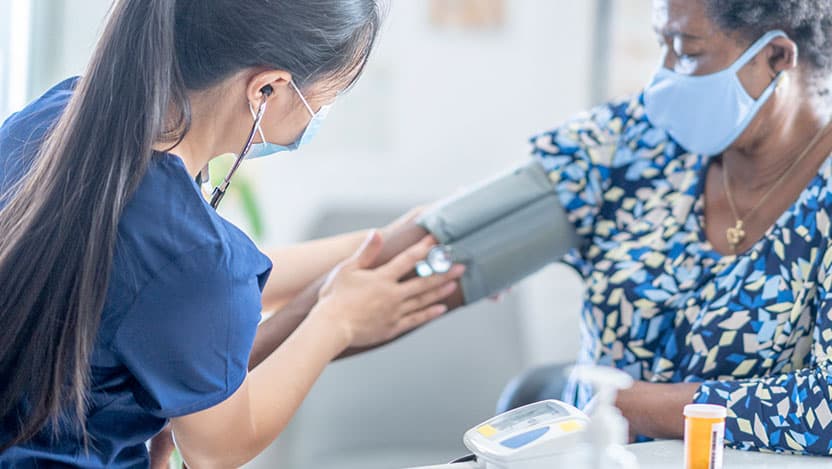How to manage diabetes and high blood pressure at any age

Both diabetes and high blood pressure are all too common in the United States. According to the Centers for Disease Control and Prevention (CDC), about 1 in 10 Americans have diabetes. Nearly half of U.S. adults have high blood pressure.
Many Americans with diabetes are unaware they have this chronic condition. Just one in four adults has their high blood pressure under control.
Left untreated, each condition can cause serious, even deadly health issues. Fortunately, there are simple ways to screen for both and excellent treatment options.
African Americans, Native Americans and Hispanics are at higher risk, so it’s important to make an appointment with your primary care doctor and get screened regularly.
If you have high blood pressure or diabetes, monitor your health and keep these conditions controlled, whether through lifestyle changes (exercise, diet, quitting smoking) or medication.
Diabetes
What is diabetes?
It’s a disease where the body can’t produce or doesn’t respond as well to insulin, which we all have in our body. It causes an abnormal breakdown of the food we eat and elevates levels of glucose (blood sugar) in the bloodstream. If untreated, diabetes can cause serious health issues such as kidney disease, heart disease, vision loss and other problems.
What are the basic types of diabetes?
Type 1 diabetes is usually diagnosed in children and young adults. Less than 10 percent of people with diabetes have type 1, which is usually an autoimmune reaction – the body attacks itself. We currently do not know how to prevent this, but treatment involves insulin.
Type 2 diabetes takes several years to develop and is usually diagnosed in adults. If you are overweight or obese, physically inactive, have a family history of diabetes, or are in a certain ethnic/minority group, you are at higher risk.
Gestational diabetes is diabetes that’s first diagnosed during pregnancy. All pregnant women are screened for this, and then typically started on medication if found to have diabetes.
Who should get screened for type 1 and type 2 diabetes?
Children aren't routinely screened for type 1 diabetes unless they exhibit symptoms like frequent urination, thirst, blurry vision, unintentional weight loss, nausea or vomiting.
For type 2 diabetes, individuals who are overweight or obese and over age 40 should get screened with a blood test. If blood sugar levels are normal, screening typically continues every one to three years.
How do you treat diabetes?
For type 1 diabetes, the treatment is insulin.
For type 2 diabetes, the treatment depends on age, other health conditions and your A1C (blood sugar) levels. Depending on test results, lifestyle changes might be recommended before medication. This may include reducing carbohydrate intake (e.g., rice, pasta, bread), avoiding soda, and exercising for 150 minutes a week. If your A1C levels are high or there are coexisting conditions like obesity, heart disease, stroke history, high blood pressure, or kidney disease, medication may be discussed.
It's important to monitor and control diabetes with follow-up appointments recommended every three months.
High blood pressure
Who should get screened?
Everyone should get their blood pressure measured annually starting in early childhood. Blood pressure is the pressure of the blood pushing against the walls of your arteries.
What are the symptoms of high blood pressure?
A lot of times, patients with high blood pressure feel well and do not have symptoms. It can be a silent disease. Other patients experience symptoms such as headaches or blurry vision.
What are the consequences of high blood pressure?
If left untreated, it increases your chances of having a stroke, heart attack or developing heart disease.
What increases your risk for high blood pressure?
Lifestyle is extremely important. Alcohol, smoking, a diet high in salt and fat, and a sedentary lifestyle all contribute or can lead to high blood pressure. Certain groups — African Americans, Native Americans and Hispanic — are at higher risk.
Do kids get high blood pressure?
Yes, children can develop high blood pressure. Although this is rare, children who are overweight or obese, have a diet high in fat and are not very active stand a higher chance of developing blood pressure issues in adolescence or later in life. It is important to start healthy habits and schedule annual physicals to prevent children from developing problems with their blood pressure.
Choosing a Primary Care Doctor
Your primary care provider (PCP) is your main health care provider and is involved in your short and long-term medical care.
Find a primary care provider at UChicago Medicine